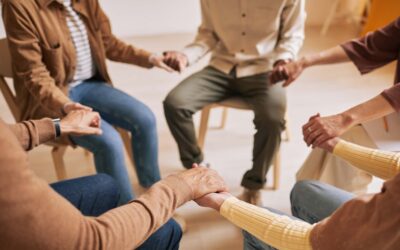Understanding the Need for Support
Navigating the recovery process often begins with recognizing how substance use can lead to isolation. Initially, social drinking or recreational drug use might seem harmless. Over time, this behavior can escalate into a pattern of isolation, where substance use becomes a solitary activity.
Reconnecting with potential supporters post-treatment is crucial. Building your support network in recovery involves reaching out to those who understand and can assist in your journey. This reconnection not only provides emotional backing but also helps reestablish healthy relationships that may have been strained.
Feelings of disconnection can significantly impede recovery efforts. A support network diminishes these feelings by offering companionship and understanding, key elements in maintaining motivation and resilience. The Alcoholics Anonymous helpline and similar resources play a pivotal role in bridging the gap between isolation and community, setting a foundation for successful recovery.
Benefits of a Support Network
A strong support network is crucial for preventing relapse. Being around people who understand your journey can greatly lower the chances of falling back into old habits. This community holds you accountable and motivates you to make choices that align with your recovery goals.
Improved Recovery Outcomes
Being part of a supportive network improves recovery outcomes through regular communication and shared experiences. Talking openly with others creates a space where you can discuss both challenges and victories, helping you stay dedicated to your journey.
Emotional Support and Well-Being
The psychological benefits of having a supportive community are significant. Knowing that there are people who genuinely care about your well-being gives you a deep sense of belonging and security. This emotional support boosts your confidence, helps manage stress and anxiety, and contributes to a successful recovery.
Building Lasting Relationships
Regularly engaging with such a network reinforces positive interactions and builds lasting relationships based on mutual understanding and support.
Components of a Support Network
Regular participation in meetings like Alcoholics Anonymous (AA) and Narcotics Anonymous (NA) plays a crucial role in building a strong support network. These gatherings offer shared experiences that foster understanding and empathy among participants, helping to reinforce the recovery process. Engaging with these groups consistently allows individuals to learn from others’ journeys, share their own progress, and gain insights into managing challenges during recovery.
Several types of support groups cater to different needs within the recovery community:
- AA and NA Meetings: Focus on supporting those recovering from alcohol and narcotics use through structured programs.
- Nar-Anon Meetings: Designed for family members and friends affected by someone else’s addiction, offering emotional support and guidance.
- Other Specialized Groups: Tailored to specific demographics or issues, such as LGBTQ+ groups or women-only meetings.
Incorporating these resources into your routine can significantly enhance your recovery journey by connecting you with others who understand your challenges.
Rebuilding Relationships in Recovery
Mending relationships damaged by substance use requires patience, effort, and honesty. Start by acknowledging past mistakes and expressing a sincere desire to rebuild trust. Apologizing without making excuses can pave the way for forgiveness. Open communication is key; engaging in conversations that allow both parties to express feelings and expectations can help in healing wounds.
Therapy sessions play a crucial role in fostering long-term supportive relationships. Participating in family or couples therapy provides a safe space to address unresolved issues and learn effective communication skills. Professional guidance can be invaluable, offering tools to navigate complex emotional landscapes and set boundaries that benefit both parties.
Building your support network in recovery depends on rekindling connections with loved ones who understand your journey. Involving them in your recovery process not only strengthens ties but also creates allies who provide encouragement and accountability as you work towards lasting change.
Engaging in Non-Recovery Activities for Connection
Participating in hobbies and sports offers a unique way to make new connections during recovery. Doing activities you love, like joining a local soccer league or taking part in community classes, gives you chances to meet people with similar interests. These common hobbies can naturally lead to friendships based on positive experiences instead of past substance use.
The Importance of Creative Arts in Recovery
Creative arts play a crucial role in mental health during recovery. Activities such as painting, writing, or playing music not only provide therapeutic benefits but also improve emotional expression and relieve stress. These artistic endeavors can be both personal and communal, enabling you to bond with others who understand the transformative power of art.
- Hobbies: A gateway to meeting new people through shared interests.
- Community Classes: Opportunities for learning and connecting.
- Creative Arts: Essential for emotional well-being and social bonding.
This diverse approach strengthens your support network while enriching your personal recovery journey.
Navigating Relationships During Recovery
Building new friendships during recovery can be both rewarding and challenging. It’s crucial to approach these new connections with caution, as forming connections without careful consideration may risk triggering relapse.
When engaging in new relationships, it’s essential to be mindful of the quality rather than the quantity of friendships. Opt for environments that align with your recovery goals, such as support groups or sober activities. Creating a home environment that supports recovery can also play a significant role in selecting friends who genuinely understand and respect your journey.
Allow friendships to develop naturally without imposing pressure or expectations. Authentic bonds are formed over time, through shared experiences and mutual trust. By letting relationships evolve organically, you reduce stress and create a more supportive network.
Recovery coaching can offer guidance in navigating these waters, providing insights on how to foster healthy connections. Embracing this support ensures you form relationships that enhance your recovery journey instead of hindering it.
Effective Communication and Education with Your Support Network
Clear communication is essential when building your support network in recovery. Expressing your needs openly to family, friends, and members of an addiction support group helps them understand how they can best assist you. This dialogue is crucial, as it fosters a supportive environment where you feel heard and valued.
Educating loved ones about addiction challenges and the recovery process enhances their understanding and empathy. Sharing insights from your journey or involving them in educational sessions can break down misconceptions and build stronger connections. Family members who are informed about addiction are more likely to provide meaningful support.
- Communicate Needs: Be honest about what you need from your support network.
- Educate Loved Ones: Share information about addiction and recovery to foster empathy.
- Leverage Support Groups: Utilize the collective wisdom of your addiction support group for guidance on effective communication strategies.
These steps contribute significantly to building a nurturing and informed support network in recovery.
Positive Reinforcement in Building Your Support Network
Building a strong support network requires actively responding to offers of help from your community. When someone offers assistance, see it as an opportunity to strengthen those connections. Whether it’s accepting advice from a trusted friend or participating in an Alcoholics Anonymous meeting, your positive response can enhance your journey.
The Importance of Gratitude
Expressing gratitude is crucial in reinforcing these relationships. A simple thank you can make a significant impact in showing appreciation for the ongoing support you receive. It not only acknowledges the effort of others but also nurtures a sense of belonging and mutual respect.
Ways to Reinforce Your Support Network
Here are two key actions you can take to reinforce your support network:
- Responding Positively: Embrace offers of assistance as they come, recognizing them as essential building blocks of your recovery network.
- Impact of Gratitude: Regularly convey your appreciation, creating a cycle of positivity that encourages continued support and understanding.
Engage with your network openly and appreciatively, setting the groundwork for meaningful and lasting connections.
Regular Check-ins for Mutual Support and Strengthening Relationships
Maintaining regular contact with your support network is crucial in recovery. These frequent check-ins help reinforce the bonds with those who understand your journey and provide the necessary mutual support essential in this process. Communication doesn’t always have to be about challenges; sometimes, sharing successes can be equally important in strengthening relationships.
Consider employing these strategies:
- Scheduled Meetings: Set up regular times to meet or call your support network members. This could be a weekly coffee catch-up or a video call. Consistency builds trust and reliability.
- Peer Support Specialists: Engaging with a certified peer support specialist can offer guidance tailored to your specific needs. They bring valuable insights into maintaining sobriety and navigating social dynamics.
- Digital Tools: Leverage technology by using apps designed for support for alcoholics that facilitate connection through reminders and forums where you can share updates.
In addition to these strategies, it’s essential to understand how to support a loved one in addiction treatment. These practices ensure a robust support system, promoting resilience and accountability throughout your recovery journey.
Community Engagement: Finding Belonging and Purpose Beyond Substance Use
Participating in community activities offers a powerful way to build your support network in recovery. Engaging in local events, volunteering, or joining clubs not only expands your social circle but also fosters connections with individuals who share similar interests. This active involvement helps develop a sense of belonging that is crucial during the recovery process.
Benefits of Community Engagement:
- Building Connections: By interacting with others through shared goals or interests, you reinforce relationships outside of substance use.
- Sense of Purpose: Activities such as community service enhance your feeling of contributing positively to society, which can be incredibly rewarding.
- Personal Growth: Exploring new hobbies or skills introduces novelty into life, encouraging personal development and self-discovery.
A support network enriched by community engagement strengthens your recovery journey, creating a fulfilling life that extends beyond past dependencies. Participating in these activities not only builds connections but also instills purpose and meaning in everyday experiences.
Seek Help from West LA Recovery in Building Your Support Network
Building your support network in recovery is a crucial step towards sustained sobriety and personal growth. At West LA Recovery, we understand the challenges you face in this journey and offer tailored assistance to help you succeed.
1. Personalized Support Network
Reach out to us for guidance on forming a support network that aligns with your unique recovery needs. Our experienced team will help you connect with individuals and groups that provide encouragement and understanding, including support groups that are vital for your healing process.
2. Expert Guidance
With our expertise, you’re not alone in navigating the complexities of recovery. We offer insights and resources to fortify your connections, ensuring a robust network of support. Our comprehensive guide on building a support system for lasting change can provide valuable strategies.
Seeking help from West LA Recovery is an empowering choice. Take this step confidently, knowing that our dedicated team is here to support you every step of the way. Engage with us through our contact page and let’s work together to build a resilient support system tailored just for you.







